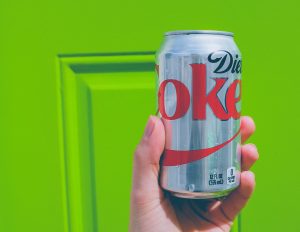 There is a lot of talk about the benefits and risks of using artificial sweeteners. There’s also a lot of different types of artificial sweeteners to use. While I’m all for people finding things that help them lose weight, I tend to lean with the group that focuses more on getting sweetness naturally, from fresh fruits, and cutting out any unnecessary added sugar. Whether using a higher calorie sugar that’s natural or one made in the lab, changing eating habits and reducing the amount of sweeteners, natural or artificial, is important.
There is a lot of talk about the benefits and risks of using artificial sweeteners. There’s also a lot of different types of artificial sweeteners to use. While I’m all for people finding things that help them lose weight, I tend to lean with the group that focuses more on getting sweetness naturally, from fresh fruits, and cutting out any unnecessary added sugar. Whether using a higher calorie sugar that’s natural or one made in the lab, changing eating habits and reducing the amount of sweeteners, natural or artificial, is important.
What are the various types of artificial sweeteners.
While the FDA approved five types of artificial sweeteners, which include acesulfame, saccharin, neotame, aspartame and sucralose, the way each reacts in the body and brain is different and complex. They make changes in the brain and taste buds that affect how we perceive the taste of food. These sweeteners are often far more potent and overstimulate the receptors for sweetness, changing our taste and even affecting how palatable natural sugars like fruit or even low sugar natural food like vegetables are. That can lead to an unhealthy change in diet.
Let them eat cake.
Marie Antoinette could have been a proponent of artificial sweeteners. “So you drank a diet Pepsi! Let them eat cake!” It’s how our minds work. We feel that we saved calories on one thing, so we can splurge on another. Not only do artificial sweeteners trick the palate into desiring sweeter and sweeter foods, trick the mind into thinking the calorie intake is far lower, artificial sweeteners are also just as addictive as sugar.
Studies show your middle will be bigger if you drink a lot of diet drinks.
There are numerous studies that indicate something is going wrong when you use artificial sweeteners. One study focused on diet drinks and found those who drank the most had the largest circumference measurement. Measuring the inches around your middle is an indication of visceral fat, the most unhealthy type of fat. Another study showed that diet drinks increased the risk for metabolic disease by 36% and the risk of type 2 diabetes by 67%.
- Most of the studies using artificial sweeteners focused on smaller amounts of intake. Many people eat more than just one food item or drink with artificial sweeteners each day. Nobody knows for sure the actual effect those chemicals contained will have over a number of years of use.
- Some people truly benefit from using artificial sweeteners. Those trying to control weight or blood sugar may find prudent use helpful.
- Studies published in Stroke—a journal that publishes medical research—showed that people who drank more than 24 ounces of diet cola increased their risk of stroke by 23% over those who drank 12 ounces or less.
- The human digestive system and microbiome is sensitive to some changes. Changes in gut microbiome via consumption of artificial sweeteners and other lab made foods, could cause other changes in the body. The microbiome affects all functions, including mental health issues.
Contact us today at Next Level Fitness
